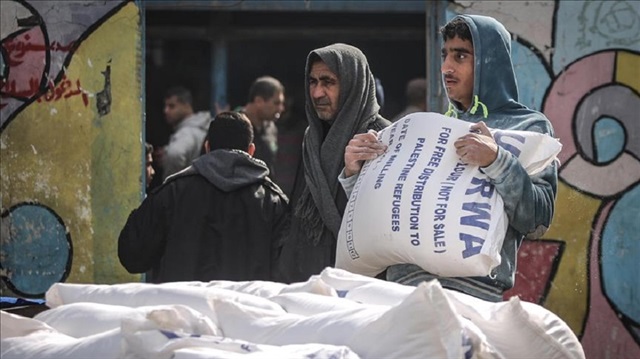
Halt to US' $350M likely to cause 'dramatic, unpredictable, profound and widespread' consequences, UNRWA spokesman says
Should Washington choose to sever its funding for the UN's Palestine refugee agency the consequences would ripple throughout the region, the agency warned Wednesday.
UNRWA spokesman Christopher Gunness told Anadolu Agency the effects of the U.S. halting $350 million in annual aid would likely "be dramatic, unpredictable, profound and widespread.”
“You have to ask yourself the question: what would the Middle East look like if the most vulnerable people in that region were not to be receiving services from a UN humanitarian organization," Gunness said.
"I think the answer is there would be a lot more angry, and hungry, and ill-educated people and that does not bode well for peace in the Middle East,” he added.
Foreign Policy magazine reported the looming cut on Tuesday, saying it was decided during an August meeting between Secretary of State Mike Pompeo and U.S. President Donald Trump's senior advisor and son-in-law, Jared Kushner.
Regional governments have been informed of the upcoming move, according to the magazine.
The cut could upend UNRWA's activities which include providing schooling, health services and food security to more than 5 million Palestinians living in the West Bank, Gaza Strip, Jordan, Syria and Lebanon.
So far the agency has not been officially informed of the move, Gunness said.
The U.S. is by far UNRWA's largest donor, providing about one-quarter of the agency's total funding.
Kushner and U.S. Ambassador to the UN Nikki Haley have been at the forefront of the effort to halt American support for UNRWA, alleging the organization is biased against Israel and unfairly counts the number of refugees to whom it provides services.
Their efforts had been opposed by former Secretary of State Rex Tillerson, and continue to be by the Pentagon and the U.S. intelligence community who fear it would heighten instability, according to Foreign Policy.
But Kushner and Haley have been doggedly persistent under the belief that tightening the U.S.'s financial screws on the Palestinians will bring them back to the negotiating table after they dismissed any possible U.S. role in the talks in retaliation for Trump's decision to unilaterally recognize Jerusalem as Israel's capital last December.
The U.S. announced last Friday it is cutting more than $200 million in aid to Palestine following a review initiated by Trump. The funds were earmarked for the Palestinian Authority and various programs in the West Bank and Gaza.
The announcement followed an earlier cut to a funding installment for UNRWA in January that halted more than half of a $125 million payment.
Trump sparked international uproar for his decision to recognize Jerusalem as Israel's capital. The move undercut long-standing underpinnings of Israeli-Palestinian peace talks where the city's status was to be determined as a final-status issue.
The Palestinians have snubbed calls from the Trump administration to return to the negotiating table, arguing Washington gave up its status as a neutral mediator by making the declaration.
The likely forthcoming cut to UNRWA's funding comes as Trump and his team prepare to rollout their long-mulled peace plan to end the Israeli-Palestinian conflict, spearheaded by Kushner.
Foreign Policy reported Kushner sought to reprogram UNRWA's funding to the Jordanian government if it would agree to fully naturalize Palestinians living in Jordan and accept they would not be allowed to return to Israel, a matter known as the “right of return” to their homes and villages in historical Palestine from which they were driven in 1948 to make way for the new state of Israel. That, like Jerusalem, was long-understood to be a matter for negotiations.
Amman, however, rejected Kushner's offer, according to Foreign Policy. After meeting with Pompeo and Jason Greenblatt, Trump's Middle East peace envoy, Jordanian Foreign Minister Ayman Safadi said on Twitter he stressed the "urgency of supporting #UNRWA."
The matter also came up in Safadi's later meetings with the top diplomats of Sweden and Japan, he said in subsequent Twitter posts.
Jordan is planning an UNRWA funding event for this September's UN General Assembly gathering in New York.



